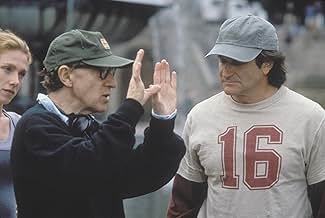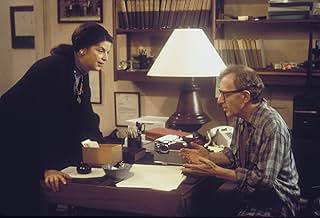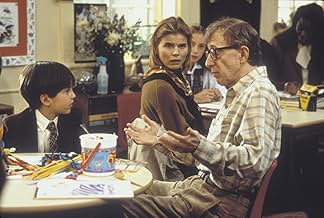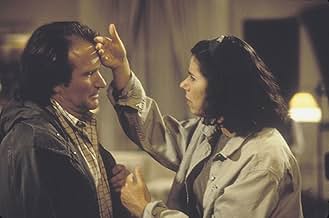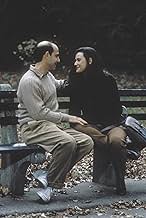कोरे कागज़ अवरोध से पीड़ित और अपने लेखन पुरस्कार का बेसब्री से इंतजार करते हुए, हैरी ब्लाक को अपने अतीत की घटनाएँ और अपनी सबसे ज्यादा बिकने वाली किताबों के असली और काल्पनिक पात्र त्रस्त करने... सभी पढ़ेंकोरे कागज़ अवरोध से पीड़ित और अपने लेखन पुरस्कार का बेसब्री से इंतजार करते हुए, हैरी ब्लाक को अपने अतीत की घटनाएँ और अपनी सबसे ज्यादा बिकने वाली किताबों के असली और काल्पनिक पात्र त्रस्त करने लगते हैं.कोरे कागज़ अवरोध से पीड़ित और अपने लेखन पुरस्कार का बेसब्री से इंतजार करते हुए, हैरी ब्लाक को अपने अतीत की घटनाएँ और अपनी सबसे ज्यादा बिकने वाली किताबों के असली और काल्पनिक पात्र त्रस्त करने लगते हैं.
- 1 ऑस्कर के लिए नामांकित
- 4 जीत और कुल 6 नामांकन
- Janet
- (as Stephanie Roth)
- Yankee Announcer
- (वॉइस)
फ़ीचर्ड समीक्षाएं
Of course cinema is a medium to create a near-perfect realism on a fictional story. But it can also be an artistic medium. Playing with the possibilities. An example in this film is Robin Williams. A men who is 'out of focus'.
The story is, like most films, not very original. A character that struggles with his personality and social life. But unlike most movies, you can see an artist made this film. It's a Woody Allen creation. His own style, his own characters, his own humor. Not a collection of an expensive scriptwriter with an expensive director, an expensive special effects team , an expensive director of photography etc. to make a total non-personal creation for the big public. Of course the whole crew did a perfect job, but it is surely a Woody Allen film!
A great movie with a nice plot. Some nice switching in timeline and fiction / reality (for the story that is) makes it more interesting then the story really is. Also the jumpcuts, the camera movement, the cast and the humor are making this film a must see! Even if you are not a Woody Allen fan you will like this movie. If you are a fan of big blockbuster movies (standard Hollywood confention movies) this movie is a must see as well! Not only to see the real art of cinema (something different then perfect special effects) but also just for a nice evening and some good humor.
Harry Block: "Six shrinks later, three wives down the line, and I still can't get my life together".
By its structure,"Deconstructing Harry" reminds the earlier film by one of Allen's favorite directors, Ingmar Bergman, "Wild Strawberries". As Professor Borg, Harry Block travels by car to upstate New York, where his college that expelled him as an undergraduate now wants to honor him as a world renowned belletrist. He travels by car with three unlikely companions, a hooker, a friend with bad heart, and his 9-years-old son whom he had kidnapped from school. As in "Wild Strawberries", Allen's film provides sincere, intelligent, and emotional contemplations of life's disappointment, regrets, and losses but at the same time, it is hilarious as only Allen's films can be. One of the best scenes of the film is Harry's descent on the elevator to air-conditioned Hell where in the ninth circle he meets the Devil who looks very much like Billy Crystal. Another wonderful scene concerns a married couple where after thirty years of happy uneventful marriage a wife learns some interesting eating habits from her husband's previous life. I can go on for long time. As often in the case of Allen's movies, with the modest running time of 96 minutes, "Deconstructing Harry" is expertly shot, boasts an amazing cast (Billy Crystal, Judy Davis, Bob Balaban, Elisabeth Shue, Demi Moore, Julia Louis-Dreyfus, Tobey Maguire, and Stanley Tucci just to name a few), and is in my opinion one of the most interesting and personal Allen's films.
In this film, Allen's alter ego is Harry Block, a writer in the mould of Philip Roth who, in the words of one his exes, turns everyone else's suffering into literary gold. And this assertion is corroborated by the opening scene, a section from one his books where a man and a woman who are having an affair, during a barbecue, decide to have sex in a bathroom while their spouses are eating in the garden. It's a very funny scene, especially as an attempted blow-job is interrupted by a false alarm (the woman grinds her teeth when the man spots his wife) and as some doggy-style sex is interrupted by the woman's blind grandmother coming into the room (when asked what's happening, the woman tells her grandmother that she's making Martinis while they continue banging away). But while the scene is absolutely hilarious, it does also have a point. This is a scene from Harry's life. He's using it in his work. Therefore his ex isn't too happy to find this episode in his book. Of course, Harry tries to explain that it was 'loosely based' (the grandmother was an embellishment), but that doesn't cut much ice with his ex, who's having all of the sordid details of her affair revealed to friends and family. So the film touches on ideas of a writer's responsibility. What's exploitation and what's inspiration?
One of the most revealing sections of the film is when Harry talks to his therapist. He discusses his attitude to women. "I'm always thinking of f****** every woman I meet I see a woman on a bus. I think what she looks like naked. Is it possible I might f*** her?" Essentially Harry is a man who has never grown up. He can't commit and he can't sustain a relationship with a woman, a fact backed up by his string of exes and his affection for prostitutes. Indeed, for him, whores are perfect. You don't have to woo them, they don't nag you and they do whatever you want; all you've got to do is pay them. And in the film, Harry takes Cookie, a black prostitute ("Do you know what a black hole is?" Harry asks her. "Yeah, that's how I make my living.") with him to an honouring ceremony at his old school.
Harry also takes a friend along with him and his young son well, he actually 'kidnaps' his son. And the whole journey, the whole act of going back to remember the past, brings back memories of stories he wrote, stories that are thinly veiled versions of actual events. One of the funniest is a story of a man who married his therapist. At first everything is great, the woman understands the man like no other woman in the world. But once they have a child she becomes "Jewish with a vengeance". No longer is she smart and funny and sexy; all of a sudden she's a dowdy nag who's rediscovered her religion. And in one hilarious moment she even prays before administering a blow-job. Again it's highly amusing, but again it has a point; Harry wants everything to remain perfect. He can't understand why people have to change. I mean, even having a child doesn't change him. He talks to his son about naming his penis. He may be getting on, but he's still really just a kid.
Harry's whole life philosophy is neatly summed up by his half-sister: "You have no values. With you it's all nihilism, cynicism, sarcasm and orgasm." To which Harry quips, "Hey, in France I could run for office with that slogan, and win!" But although Harry may be deemed to be juvenile, he's entirely correct about religion. He tells his devout sister that they're clubs and that their function is to exclude people. And then he asks her whether it bothers her more when a Jew gets killed or a gentile. She says a Jew death bothers her more "They're my people." "They're all our people," he replies. I'm with Harry. Religions are nothing but divisive. Plus they encourage people to prove how devout they are as if you can be more Jewish than someone else, or more Catholic etc. It all becomes a competition.
But amongst all this, the only thing that Harry can do to remain sane is to write. Somehow life doesn't make any sense but fiction does. I guess it's a problem most writers have. To able to write you have to observe, but the more you observe the less you understand why people behave the way they do. Plus the more you observe the more you actually remove yourself from life. However, self-examination does allow Harry to become more perceptive as regards himself. In fact, his characters help him out a lot, as they offer insights that he couldn't possibly come up with alone. So although the film's coarse, it ends up being quite optimistic. Salvation lies within.
क्या आपको पता है
- ट्रिवियाAlbert Brooks was the last actor to be offered the role of Harry. In an interview with Playboy magazine, he stated that he received a nice letter from Woody Allen offering him the role. Brooks responded, "It was insane that Allen didn't do it himself." Apparently, Woody took his advice.
- गूफ़In Harry's line "I once almost ran over a book critic..." the word "book" doesn't match his lips; "book" is dubbed over what looks to be "film."
- भाव
Harry Block: Tradition is the illusion of permanence.
Doris: You have no values. Your whole life: it's nihilism, it's cynicism, it's sarcasm and orgasm.
Harry Block: You know, in France, I could run on that slogan and win.
टॉप पसंद
- How long is Deconstructing Harry?Alexa द्वारा संचालित
विवरण
- रिलीज़ की तारीख़
- कंट्री ऑफ़ ओरिजिन
- आधिकारिक साइट
- भाषाएं
- इस रूप में भी जाना जाता है
- The Meanest Man in the World
- फ़िल्माने की जगहें
- उत्पादन कंपनियां
- IMDbPro पर और कंपनी क्रेडिट देखें
बॉक्स ऑफ़िस
- बजट
- $2,00,00,000(अनुमानित)
- US और कनाडा में सकल
- $1,06,86,841
- US और कनाडा में पहले सप्ताह में कुल कमाई
- $3,56,476
- 14 दिस॰ 1997
- दुनिया भर में सकल
- $1,06,86,841
- चलने की अवधि1 घंटा 36 मिनट
- रंग
- ध्वनि मिश्रण
- पक्ष अनुपात
- 1.85 : 1
इस पेज में योगदान दें



